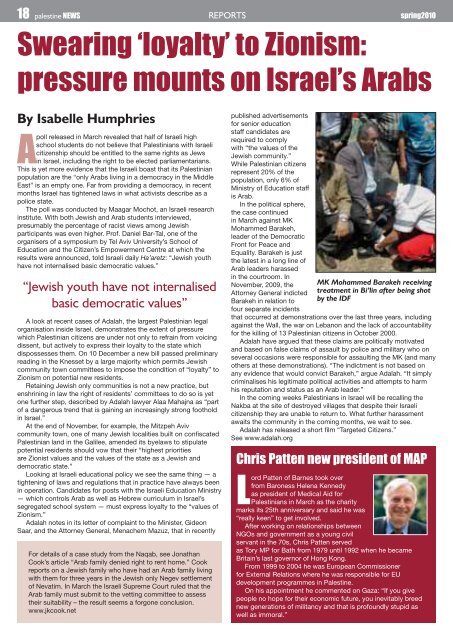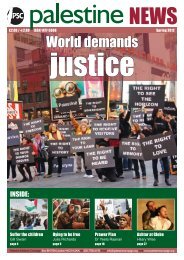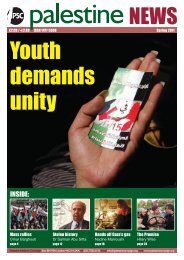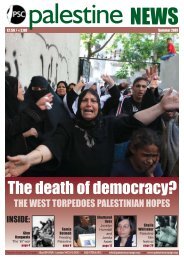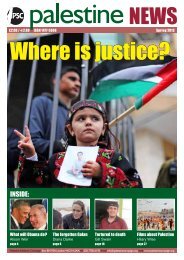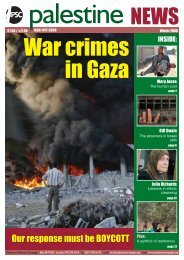INSIDE: - Palestine Solidarity Campaign
INSIDE: - Palestine Solidarity Campaign
INSIDE: - Palestine Solidarity Campaign
Create successful ePaper yourself
Turn your PDF publications into a flip-book with our unique Google optimized e-Paper software.
18 palestine NEWS REPORTS<br />
spring2010<br />
Swearing ‘loyalty’ to Zionism:<br />
pressure mounts on Israel’s Arabs<br />
By Isabelle Humphries<br />
A<br />
poll released in March revealed that half of Israeli high<br />
school students do not believe that Palestinians with Israeli<br />
citizenship should be entitled to the same rights as Jews<br />
in Israel, including the right to be elected parliamentarians.<br />
This is yet more evidence that the Israeli boast that its Palestinian<br />
population are the “only Arabs living in a democracy in the Middle<br />
East” is an empty one. Far from providing a democracy, in recent<br />
months Israel has tightened laws in what activists describe as a<br />
police state.<br />
The poll was conducted by Maagar Mochot, an Israeli research<br />
institute. With both Jewish and Arab students interviewed,<br />
presumably the percentage of racist views among Jewish<br />
participants was even higher. Prof. Daniel Bar-Tal, one of the<br />
organisers of a symposium by Tel Aviv University’s School of<br />
Education and the Citizen’s Empowerment Centre at which the<br />
results were announced, told Israeli daily Ha’aretz: “Jewish youth<br />
have not internalised basic democratic values.”<br />
“Jewish youth have not internalised<br />
basic democratic values”<br />
A look at recent cases of Adalah, the largest Palestinian legal<br />
organisation inside Israel, demonstrates the extent of pressure<br />
which Palestinian citizens are under not only to refrain from voicing<br />
dissent, but actively to express their loyalty to the state which<br />
dispossesses them. On 10 December a new bill passed preliminary<br />
reading in the Knesset by a large majority which permits Jewish<br />
community town committees to impose the condition of “loyalty” to<br />
Zionism on potential new residents.<br />
Retaining Jewish only communities is not a new practice, but<br />
enshrining in law the right of residents’ committees to do so is yet<br />
one further step, described by Adalah lawyer Alaa Mahajna as “part<br />
of a dangerous trend that is gaining an increasingly strong foothold<br />
in Israel.”<br />
At the end of November, for example, the Mitzpeh Aviv<br />
community town, one of many Jewish localities built on confiscated<br />
Palestinian land in the Galilee, amended its byelaws to stipulate<br />
potential residents should vow that their “highest priorities<br />
are Zionist values and the values of the state as a Jewish and<br />
democratic state.”<br />
Looking at Israeli educational policy we see the same thing — a<br />
tightening of laws and regulations that in practice have always been<br />
in operation. Candidates for posts with the Israeli Education Ministry<br />
— which controls Arab as well as Hebrew curriculum in Israel’s<br />
segregated school system — must express loyalty to the “values of<br />
Zionism.”<br />
Adalah notes in its letter of complaint to the Minister, Gideon<br />
Saar, and the Attorney General, Menachem Mazuz, that in recently<br />
For details of a case study from the Naqab, see Jonathan<br />
Cook’s article “Arab family denied right to rent home.” Cook<br />
reports on a Jewish family who have had an Arab family living<br />
with them for three years in the Jewish only Negev settlement<br />
of Nevatim. In March the Israeli Supreme Court ruled that the<br />
Arab family must submit to the vetting committee to assess<br />
their suitability – the result seems a forgone conclusion.<br />
www.jkcook.net<br />
published advertisements<br />
for senior education<br />
staff candidates are<br />
required to comply<br />
with “the values of the<br />
Jewish community.”<br />
While Palestinian citizens<br />
represent 20% of the<br />
population, only 6% of<br />
Ministry of Education staff<br />
is Arab.<br />
In the political sphere,<br />
the case continued<br />
in March against MK<br />
Mohammed Barakeh,<br />
leader of the Democratic<br />
Front for Peace and<br />
Equality. Barakeh is just<br />
the latest in a long line of<br />
Arab leaders harassed<br />
in the courtroom. In<br />
November, 2009, the<br />
Attorney General indicted<br />
Barakeh in relation to<br />
four separate incidents<br />
MK Mohammed Barakeh receiving<br />
treatment in Bi’lin after being shot<br />
by the IDF<br />
that occurred at demonstrations over the last three years, including<br />
against the Wall, the war on Lebanon and the lack of accountability<br />
for the killing of 13 Palestinian citizens in October 2000.<br />
Adalah have argued that these claims are politically motivated<br />
and based on false claims of assault by police and military who on<br />
several occasions were responsible for assaulting the MK (and many<br />
others at these demonstrations). “The indictment is not based on<br />
any evidence that would convict Barakeh,” argue Adalah. “It simply<br />
criminalises his legitimate political activities and attempts to harm<br />
his reputation and status as an Arab leader.”<br />
In the coming weeks Palestinians in Israel will be recalling the<br />
Nakba at the site of destroyed villages that despite their Israeli<br />
citizenship they are unable to return to. What further harassment<br />
awaits the community in the coming months, we wait to see.<br />
Adalah has released a short film “Targeted Citizens.”<br />
See www.adalah.org<br />
Chris Patten new president of MAP<br />
Lord Patten of Barnes took over<br />
from Baroness Helena Kennedy<br />
as president of Medical Aid for<br />
Palestinians in March as the charity<br />
marks its 25th anniversary and said he was<br />
“really keen” to get involved.<br />
After working on relationships between<br />
NGOs and government as a young civil<br />
servant in the 70s, Chris Patten served<br />
as Tory MP for Bath from 1979 until 1992 when he became<br />
Britain’s last governor of Hong Kong.<br />
From 1999 to 2004 he was European Commissioner<br />
for External Relations where he was responsible for EU<br />
development programmes in <strong>Palestine</strong>.<br />
On his appointment he commented on Gaza: “If you give<br />
people no hope for their economic future, you inevitably breed<br />
new generations of militancy and that is profoundly stupid as<br />
well as immoral.”


